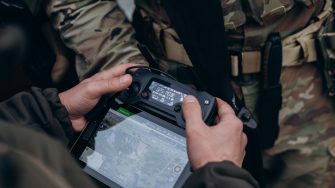Master of Special Operations and Irregular Warfare (Canberra)
- Commencing Terms
- Semester 1 & 2
- Duration
- 1 Year(s)
- Delivery Mode
- Online
- Campus
-
Canberra
- Codes
- Program code 8632
- CRICOS code -
-
2025 Indicative first year full fee
- $35,000*
-
2025 Indicative full fee to complete degree
- $35,000*
-
2025 Indicative first year full fee
- $48,000*
-
2025 Indicative full fee to complete degree
- $49,000*

- Overview
- Entry requirements
- What will I study?
- Future careers
- How to apply
- Fees & Scholarships
Overview
In today’s complex conflicts, both state and non-state actors vie for legitimacy and influence, often employing irregular warfare tactics. Special operations forces play a significant role in these dynamics, yet their strategic importance is often underexplored. The Master of Special Operations and Irregular Warfare at UNSW Canberra fills this gap, offering a specialised focus on special operations alongside electives that address broader strategic and security concerns.
This program is designed for military personnel, security policy professionals and government contractors aiming to expand their understanding of special operations beyond tactical and operational applications. You’ll gain valuable insights into special operations as an instrument of military policy, positioning you to make well-informed decisions in strategic and security contexts.
Key features
Focused expertise in special operations
Gain a deep understanding of the strategic role of special operations forces, exploring their impact within broader security and Defence contexts. This program goes beyond tactical skills, equipping you with the knowledge to analyse and apply special operations as a tool of military policy.
Flexible elective options
Tailor your studies to your career goals with a range of elective courses that address wider issues in strategy, Defence and security. This flexibility allows you to shape your degree to align with your specific interests and professional needs.
Research opportunities
For students achieving a Distinction average, the program offers an option to undertake a research thesis, allowing you to delve deeply into a specialised area of interest. This research experience is ideal for those seeking to contribute original insights to the field or pursue further academic study.
Why study at UNSW Canberra?
Be part of Australia’s Defence and policy hub
UNSW Canberra’s location in the nation’s capital places you at the heart of Australia’s Defence, security and policy-making community. You’ll benefit from proximity to key government agencies, Defence organisations and security policy experts.
Learn from leading academics
The academic staff at UNSW Canberra includes renowned experts in Defence and security studies. With close ties to government and Defence sectors, our faculty bring real-world insights directly into the classroom, ensuring your education is aligned with contemporary issues and industry needs.
Supportive, online learning environment
With small class sizes and personalised support, UNSW Canberra fosters a close-knit learning community. This environment provides opportunities for one-on-one mentorship, collaborative learning and valuable networking opportunities with professionals from the military, government and security sectors.
Want to see more from UNSW Canberra at ADFA?
Entry requirements
Please refer to the UNSW Handbook for the Entry Requirements.
English language requirements
You may be asked to provide evidence of your English proficiency to study at UNSW depending on your educational background and citizenship. English language skills are vitally important for coping with lectures, tutorials, assignments and examinations - this is why UNSW requires a minimum English language competency for enrolment.
If you’re completing an Australian Year 12 qualification (e.g. NSW HSC or equivalent), you do not need to provide anything extra to prove your proficiency. Your qualification will be used as evidence of your English proficiency.
If you do need to provide evidence of your English proficiency, this will be indicated in your application. You can prove this by providing evidence that you meet one or more of the following criteria:
- English language tests and university English courses
- Prior study in the medium of English
- Other qualifications
If you need to improve your English skills before you start your degree, UNSW College’s Academic English Programs are for you. The programs are suitable for various English levels and help you prepare for university studies and life in Australia.
Please refer to the UNSW Handbook for the Entry Requirements.
English language requirements
You may be asked to provide evidence of your English proficiency to study at UNSW depending on your educational background and citizenship. English language skills are vitally important for coping with lectures, tutorials, assignments and examinations - this is why UNSW requires a minimum English language competency for enrolment.
If you’re completing an Australian Year 12 qualification (e.g. NSW HSC or equivalent), you do not need to provide anything extra to prove your proficiency. Your qualification will be used as evidence of your English proficiency.
If you do need to provide evidence of your English proficiency, this will be indicated in your application. You can prove this by providing evidence that you meet one or more of the following criteria:
- English language tests and university English courses
- Prior study in the medium of English
- Other qualifications
If you need to improve your English skills before you start your degree, UNSW College’s Academic English Programs are for you. The programs are suitable for various English levels and help you prepare for university studies and life in Australia.
Program structure
The Master of Special Operations and Irregular Warfare comprises 8 courses (48 UOC), including core courses in special operations fundamentals and a selection of electives in broader strategic and security issues. Students can customise their studies with electives offered on a rotating basis, allowing for a tailored educational experience. Those who achieve a Distinction average in core courses may also opt to complete a research thesis, subject to approval.
Full program structure
The Master of Special Operations and Irregular Warfare is a one-year full-time program (or part-time equivalent). Students will complete 48 Units of Credit (UOC).
Core courses – At least 12 UOC
● Special Operations: Theory and Strategic Utility
● GRIM Threats (Guerrilla, Revolutionary, Insurgent and Militia) and Irregular Warfare
● Ethics in Special, Complex and Irregular Military Operations
Prescribed electives – Up to 36 UOC
● Leadership
● Contemporary Warfare
● Foundations of Modern Strategy
● Genocide: Perception and Intervention
● The Development of the Art of War: A Survey
● Australian Military History: An Introduction
● The Vietnam Wars: A Thirty Year Conflict
● The History of Special Operations
● Global Security
● Asia-Pacific Security: The Dynamics of Change
● Australian Defence Policy: Concepts and Challenges
● China's Security Policy and Military Modernisation
● Contemporary Strategy
● Cyber-Security and World Politics
● Conflict Transformation
● Culture and Conflict
● Australia and Cyber War
● Military Game Changers in 21st Century Warfare
● Space Cooperation, Conflict and Competition
Optional: Research Thesis
Students who obtain at least a Distinction average in six courses may take a 12 UOC research thesis. Enrolment is subject to approval by the Postgraduate Coordinator. See handbook for more details.
Future careers
Potential roles:
- Counterterrorism Analyst
- Defence Consultant
- Intelligence Officer
- Irregular Warfare Strategist
- Military Advisor
- Military Intelligence Officer
- National Security Advisor
- Security Strategist
- Special Operations Consultant
How to apply
Applications must be submitted through our Apply Online portal. We encourage you to submit your completed application as early as possible to ensure it will be processed in time for your preferred term. Some high-demand programs and Faculties with limited places may have an earlier application deadline or commencement date. Find out more.
Ready to start your application?
For most international students, applications are submitted via our Apply Online service. We encourage you to submit your completed application as early as possible to ensure it will be processed in time for your preferred term.
Some high-demand programs with limited places, may have an earlier application deadline or may have an earlier commencement date. For more information visit our international applicant information page.
Ready to start your application?
Fees & Scholarships
*Fees are subject to annual review (or when required) by the University and may vary accordingly.
Indicative fees are a guide only and have been calculated based on the typical enrolment patterns of students undertaking the program. The indicative fees listed here is an estimate for tuition only and excludes non-tuition fees and charges. The amount you pay will vary depending on the calendar year of enrolment, the courses you select and whether your study load is more or less than 1 Equivalent Full Time Student Load (48 units of credit (UOC) per year).
You should not rely on indicative fees as fee increases are assessed when required and may exceed the indicative figures listed here. Actual fees are calculated on enrolment. More information on fees can be found at the UNSW fees website.
*Fees are subject to annual review by the University and may increase annually, with the new fees effective from the start of each calendar year. The indicative fees listed here are based on an estimated average and are for tuition only, other fees and charges are not included. The amount you pay will vary depending on the calendar year to enrol, the courses you select and whether your study load is more or less than 1 Equivalent Full Time Student Load (8 courses per year).
Indicative fees are a guide for comparison only based on current conditions and available data. You should not rely on indicative fees. More information on fees can be found at the UNSW fees website.
Indicative fees to complete the program have been calculated based on a percentage increase for every year of the program. Fee increases are assessed annually and may exceed the indicative figures listed here.
Indicative fees to complete the program include tuition plus an estimate of study-related costs of approximately $1,000 per year. To find out more about other costs, visit UNSW International.
Scholarships
At UNSW, we award over $83 million in scholarships each year. We pride ourselves on rewarding excellence and making university accessible to students from all walks of life. Whether you’re a domestic or international student, our range of scholarships, prizes and awards can support your journey.

QS World University Rankings, 2025.

AFR Top 100 Future leaders Award.

#1 Australian uni attended by start-up founders.




